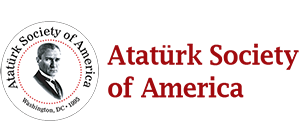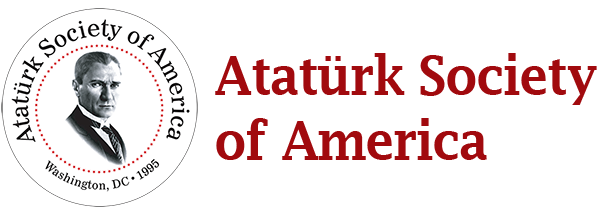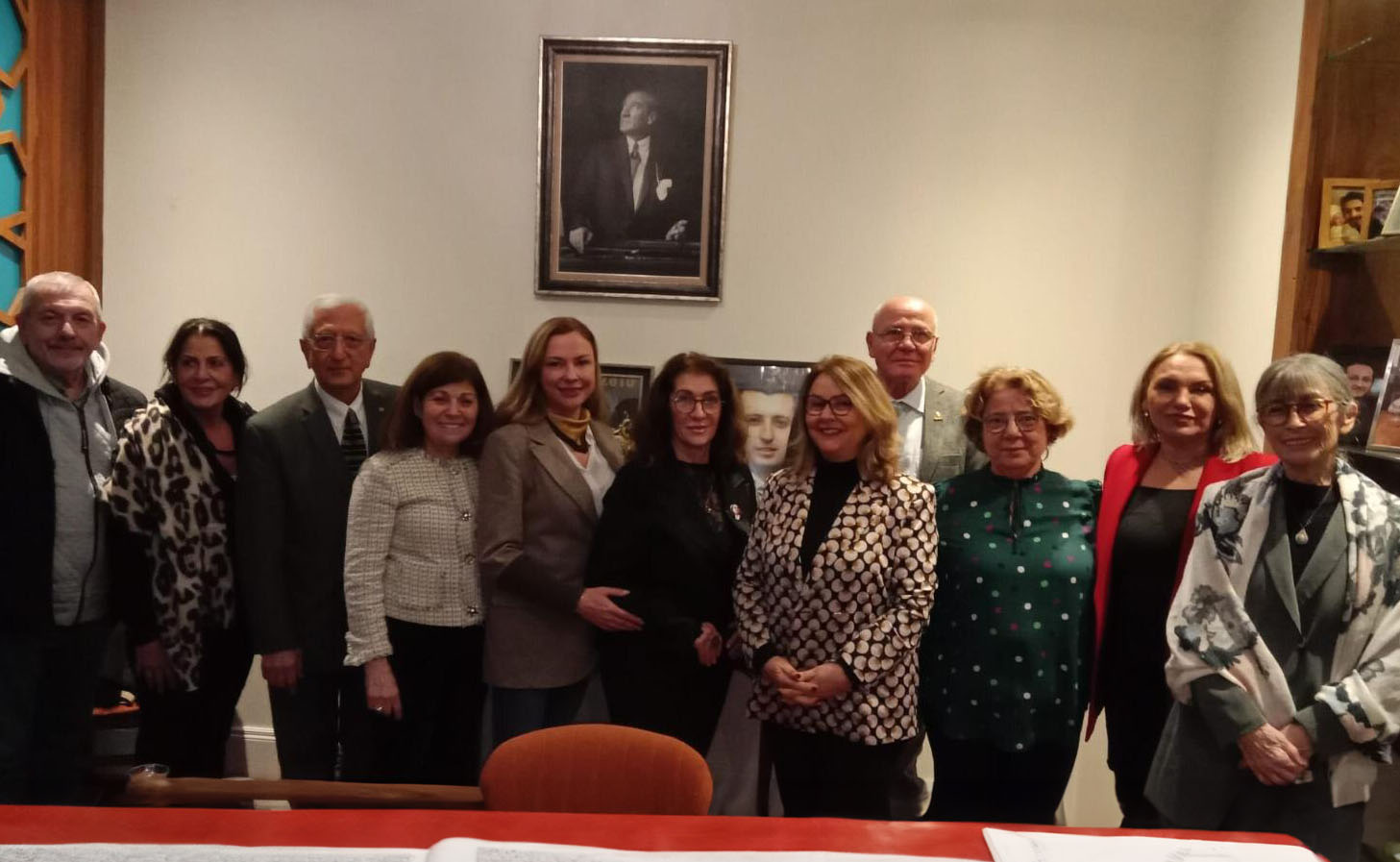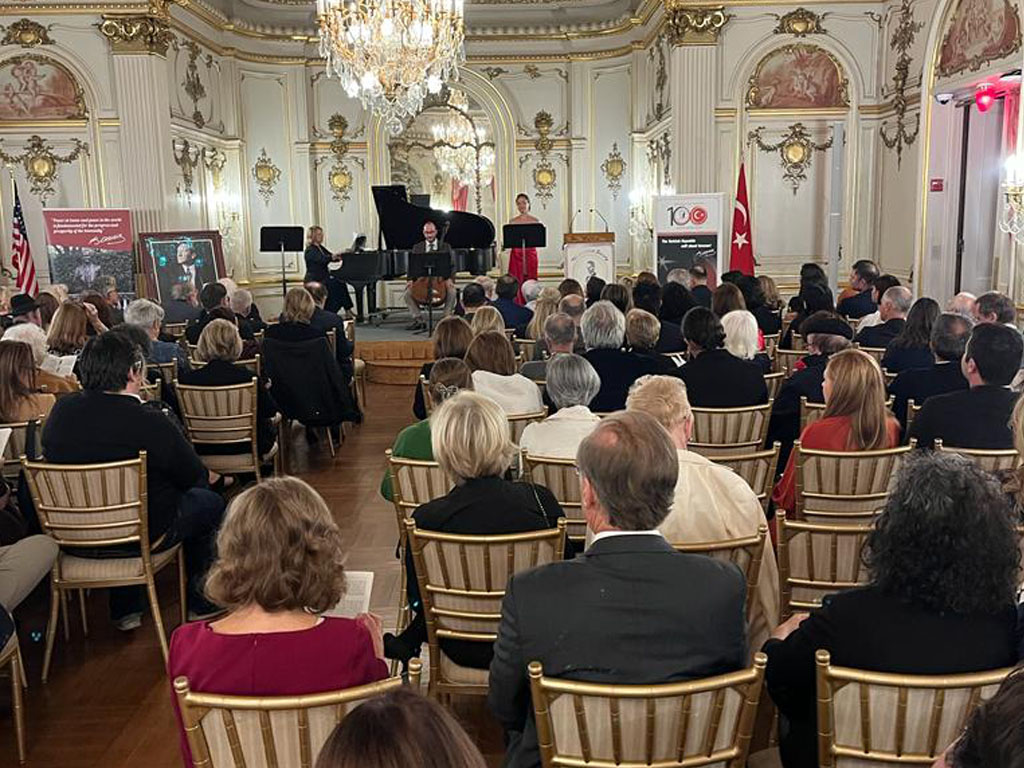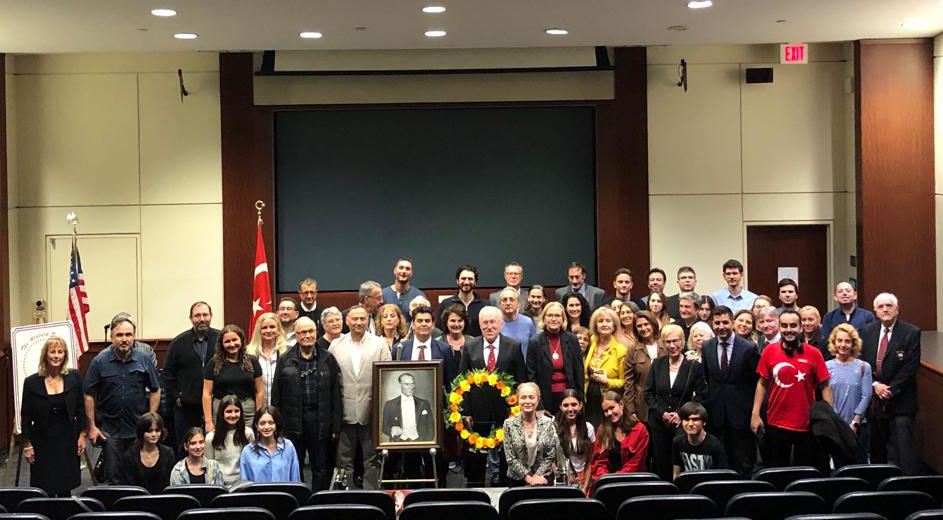In Atatürk's own words
“May 15, 1919 Occupation of Izmir, 3 years and 4months. I left Istanbul on the same day.”
(From Ataturk’s Diaries, Notebook numbered 18, p.31.Ataturk’un Not Defterleri, A. M. Inan, Gundogan Press, Second edition January1998, p.88)
“I was at Black Sea on that dark day, and here I am today at the Mediterranean Sea. I ask the world civilizations: Is this civilization,can people responsible for savage actions speak in the name of humanity, ofcivilization, of individuality? What do they want to undertake in our country? Them inorities were rich and peaceful. They were all getting along like brothers.Who made them murderers? Izmir is Turkish. Those who consider this nation incapable will learn.”
(p.30, Ibid. Inan, p.88)
“History will register with awe the BritishGovernment’s trust in such a ridiculous attempt: To make a ridiculous peoplethe conquerors of Turkey. A political and military blunder.”
(p.29, Ibid. Inan, p.88)
“Answer to Lloyd George. Some friends asked me whether I would not answer him. I said I will, leave the timing to me.”
(p.28, Ibid Inan, p.89)
“We sent our Foreign and Interior Ministers. Weproved to the world that we want peace with all our human feelings. But ourinterlocutors happened to be people who enjoy not human feelings but bloodyscenes. Is it our fault that a lot of Greek blood was shed as a result? British diplomats do not have even a residue of humanresponsibility.”
(p.27, Ibid. Inan, p. 89)
“Look at the sun rising in the East. I see the rising of eastern nations as I see the dawntoday. There are many brotherly nations that will gain their freedom andindependence. Their re-birth will no doubt be in the direction of progressand prosperity. They will succeed despite all the difficulties and hurdles,and will reach the future that is awaiting them.
Colonialism and imperialism will disappear from the faceof the earth, and they will be replaced by a harmonious co-operation era thatdoes not discriminate between colour, religion and ethnicity ofnations.”
(March 1933, as reported on 20 December 1954 in NewspaperDunya. Ataturk’ten Dusunceler, Prof. E.Z. Karal, METU PressOctober 1998 p.15)
“Anatolia, by this defence, is not only fulfilling a survivalduty for itself, but most probably is erecting a barrier against all attacksdirected to the East. All these aggressions will definitely end. Only then,real calm, real prosperity and real humane treatment will prevail in the Westand in the World.”
(October 1921, from Ataturk’s Speeches and Statements v.II. Ibid. Karal p.15)
“We are called nationalists. But we are such anationalist that we have respect for all nations who co-operate with us. Werecognize all their national requirements. Our nationalism is not a selfishand arrogant nationalism.”
(August 1920, from Ataturk’s Speeches and Statements,v.I. Ibid. Karal p.4)
“You will recall that I pronounced the National Pactin Ankara. I have to admit that I also tried to define the nationalboundaries a little along the lines of human goals of Wilsonian principles.But I should immediately add that I defended the boundaries defined anddefended by Turkish bayonets based on those human principles. Poor Wilson did not understand that the boundaries notdefended by bayonets, force, honor and dignity cannot be defended by anyother principle.”
(April 1926, from the Newspaper Hakimiyeti Milliye. Ibid. Karal p.11)
“I am one of those who expect all miracles from theparliament. We are at a stage where everything has to be legal. Doing theright thing in national affairs is possible only by relying on nationaldecisions and by reflecting the general public tendency.”
(March 1920, from Ankara’nin Ilk Gunleri, Yunus Nadi. Ibid. Karal p. 20)
“There is no such thing as ruling the nation, thereis only serving the nation.”
(Address to the National Assembly in December 1921. Ataturk Genclik ve Hurriyet, Sadi Borak, Kaynak Press, 2.edition, August 1998 p. 60)
“A military victory is insufficient for a true liberation.In our political life, in social life, in the education of people, scienceand technology will be our guide.”
(From an address to teachers in Bursa, 27 October 1922)
“Those who conquer by the sword are condemned to bedefeated by the plough….No matter how great political and militaryvictories may be , they must be crowned by economic victories otherwise theycannot be maintained, but will be extinguished.”
(From an address to the Economic Congress in Izmir, 17 February 1923)
“The Turkish Republic cannot be a country of shiekhs,dervishes and disciples. The truest and surest path is the path tocivilization.”
(From an address in Kastamonu, 30 August 1930)
“It is only education, science and teachers that cansave the nation.”
(From an address to male teachers of Izmir, 14 October1925)
“No matter how great may be the victories won by anation at the battle field, those victories may only yield lasting resultsthrough the efforts of an army of educators.”
(From an address to teachers in Kutahya, 2 April 1923)
“I am not leaving a spiritual legacy of dogmas,unchangeable petrified directives. My spiritual legacy is science andreason….What I wanted to do and what I tried to achieve for the TurkishNation is quite evident. If those people who wish to follow me after I amgone take the reason and science as their guides they will be my truespiritual heirs.”
(His reply to then Minister of Education Dr. Resit Galip,quoted by H. S. Tanriover,)
“The result we have attained today is theenlightenment which arose from centuries of national suffering, and has beenpaid for with the blood shed in every corner of this beloved land. I entrust this result with the Turkish youth.”
(From His speech delivered at the Second Congress of theRepublican People’s Party 15-20 October 1927. Nutuk-Soylev,Turk Tarih Kurumu Press 3. edition, 1989v.II, p. 1195)
“It is claimed that religious unity is also a factorin the formation of nations. Whereas, we see the contrary in the Turkishnation. Turks were a great nation even before they adopted Islam. Thisreligion did not help the Arabs, Iranians, Egyptians and others to unite withTurks to form a nation. Conversely, it weakened the Turks’ nationalrelations; it numbed Turkish national feelings and enthusiasm. This wasnatural, because Mohammedanism was based on Arab nationalism above allnationalities.” From his book on Citizenship.”
(Ataturk, Yurttaslik Bilgileri, Yenigun Haber Ajansi, June1997, pp. 18.)
“The Turkish nation is aware it is independent on theirreversible road to civilization, and also mutual human and civilizedrelations with all civilized nations are certainly necessary for continuedjoint progress as equals. They also know, like any civilized nation, toappreciate the value of nations and people who contributed to all pastcivilizations with their discoveries and inventions, and to preserve theirlegacies to humanity. The Turkish nation is a true member of theinternational society.”
(Ibid, pp.20-21)
“In our times, there are some traditionally basicprinciples on which this fundamental institution (Parliament and government)rests:
a) Democracy “People’s sovereignty”: This is theprinciple where the will and sovereignty belong and must belong to the peopleas a whole. The principle of democracy is evidenced in the principle ofnational sovereignty.
b) Representative government: This principle regulates theapplication and administration of national sovereignty.
c) The supremacy of the constitution: This principleprovides, in the contemporary constitutional law, for the judicial balanceand for respect for law.”
(Ibid, p. 29)
“1. Scrutiny and debate are entirely free. Everyoneexercises this freedom independently and without any intervention by others.
2. The freedom of scrutiny is mainly exercised through themedia.
3. The good of the public must be fundamental and be bornein mind in any scrutiny and debate. Any opinion offered must be for the goodof the people. This being the point of departure, scrutiny and debate willbenefit the state and will elevate the level of social and politicaleducation of the citizens.
4. Freedom of scrutiny of public affairs creates a forumof agreement between the government and the people. The government informsitself through the media and, as may be necessary, will inform the publicwith relevant facts. This enables the government to understand the people andthe people the government, and ensures their agreement.”
(idem, p. 72)
“The people must be the overseers of the government.If governments’ actions are unsatisfactory, and if people do not object anddenounce them they would be taking part in all the mistakes and guilt………….
Today, nations recognize only one sovereignty: sovereigntyof the people. Looking at the details of an administration we would see thatall begins in a village, a community, in other words with persons. People canbe led by any one in the wrong or right direction if they are not educated.For his/her salvation every person must take his/her future in his/her ownhands. An institution built from bottom to top, from the foundation to theroof will certainly be strong.”
From a speech at the Agricultural School in Ankara onDecember 28, 1920
(Sadi Borak, Ataturk Genclik ve Hurriyet, 2. edition 1998,Kaynak Press, p.58 and E. Z. Karal, Ataturk’ten Dusunceler, Metu Press Oct.1998, p.22)
“There is no such thing as being the master of thenation, there is service for the nation.” “Gentlemen, the nationsent us here; but we are not convened here to represent the nation’ssovereignty and administer until the end of our lives, as if we inheritedthis representation.”
From an address to the Parliament, Dec. 1, 1921.
(Borak, idem, pp. 60and 61; Karal, idem, p.22)
“The goal of the war of independence was to achievefull independence and unconditional and unlimited sovereignty. The nationdeclared the plan of action for independence in the National Pact, and theplan of action for sovereignty in the Constitution.”
From a press conference in Izmit, Jan. 1923 (Karal, idem, p.5)
“Our government and our state structure are createdby the people, and are called republic. There is no longer a separationbetween the government and the people. The government is the people, thepeople is the government. The government and its members are now aware thatthey are not other than the people, and that the people are themasters.”
From a speech in Oct.1925. (Karal, idem, p. 33)
“History is made as much with emotions as withknowledge, reason and logic. It would be wrong to assume that we can erasethe centuries old emotions of our enemies with only today’s developments. Wewill erase these feelings not with victories but by adopting the contemporaryprogress, by undertaking all that is necessary for contemporary science andcivilization, and by actually reaching the level of knowledge of allcivilized nations.”
From a speech in March 1923. (Karal, idem, p.40)
“Impediments to our actions will never come from thepublic. The people want to be prosperous, independent, and wealthy; it isvery difficult to be poor while observing the wealth of the neighbors. Thosewho nourish reactionary ideas think they can rely on certain groups. This isan absolute illusion. We will destroy those who stand in our way to progress.We will not stop on the high ground of progress. The world advances in anincredible speed. Can we stay outside this rhythm?”
From a speech in Dec. 1923 (Karal, idem, p.41)
“Success towards civilization depends on renewal.Renewal is the only means to progress and development, to success in socialand economic life, in science and technology.”
“We are not yet free, the steps taken are the firststeps of those to be taken in the future.”
“The rules that governour life and our livelihood must change, develop and be renewed withtime.”
(Attila Ilhan, Hangi Ataturk, Bilgi Publications, 3.edition 1996, p.68)
“By National Policy we mean our defense within ournational borders and the work for our country’s real prosperity anddevelopment with our own power.”
From his speech on 15 Oct. 1927. (Ibid, p.76)
“All nations have become and are still becomingmembers of one family. Therefore, one has to respect the peace and prosperityof all nations as much as he/she respects the existence and happiness ofhis/her own nation. One has to endeavour to work for the happiness of allnations, if he/she values the happiness of his/her own nation.”
From a speech in 1937. (Ibid, p.76)
“It is claimed that religious unity is also a factorin the formation of nations. Whereas, we see the contrary in the Turkishnation.
Turks were a great nation even before they adopted Islam.This religion did not help the Arabs, Iranians, Egyptians and others to unitewith Turks to form a nation. Conversely, it weakened the Turks’ national relations;it numbed Turkish national feelings and enthusiasm. This was natural, becauseMohammedanism was based on Arab nationalism above all nationalities.”
From his book on Citizenship. (Ataturk, Yurttaslik Bilgileri, Yenigun Haber Ajansi, June1997, pp. 18.)
“The Turkish nation is aware it is independent on theirreversible road to civilization, and also mutual human and civilizedrelations with all civilized nations are certainly necessary for continuedjoint progress as equals. They also know, like any civilized nation, toappreciate the value of nations and people who contributed to all pastcivilizations with their discoveries and inventions, and to preserve theirlegacies to humanity. The Turkish nation is a true member of theinternational society.”
(Ibid, pp.20-21)
“In our times, there are some traditionally basicprinciples on which this fundamental institution (Parliament and government)rests:
a) Democracy ‘People’s sovereignty’: This is the principle where thewill and sovereignty belong and must belong to the people as a whole. Theprinciple of democracy is evidenced in the principle of national sovereignty.
b) Representative government: This principle regulates theapplication and administration of national sovereignty. c) The supremacy ofthe constitution: This principle provides, in the contemporary constitutionallaw, for the judicial balance and for respect for law.”
(Ibid, p. 29)
“1. Scrutiny and debate are entirely free. Everyoneexercises this freedom independently and without any intervention by others.
2. The freedom of scrutiny is mainly exercised through themedia…………….
3. The good of the public must be fundamental and be bornein mind in any scrutiny and debate. Any opinion offered must be for the goodof the people.
This being the point of departure, scrutiny and debatewill benefit the state and will elevate the level of social and politicaleducation of the citizens.
4. Freedom of scrutiny of public affairs creates a forumof agreement between the government and the people. The government informsitself through the media and, as may be necessary, will inform the publicwith relevant facts. This enables the government to understand the people andthe people the government, and ensures their agreement.”
(Ibid, p. 72)
“The people must be the overseers of the government.If governments’ actions are unsatisfactory, and if people do not object anddenounce them they would be taking part in all the mistakes and guilt………….
Today, nations recognize only one sovereignty: sovereigntyof the people. Looking at the details of an administration we would see thatall begins in a village, a community, in other words with persons. People canbe led by any one in the wrong or right direction if they are not educated.For his/her salvation every person must take his/her future in his/her ownhands. An institution built from bottom to top, from the foundation to theroof will certainly be strong.”
From a speech at the Agricultural School in Ankara onDecember 28, 1920
(Sadi Borak, Ataturk Genclik ve Hurriyet, 2. edition 1998,Kaynak Press, p.58 and E. Z. Karal, Ataturk’ten Dusunceler, Metu Press Oct.1998, p.22)
“There is no such thing as being the master of thenation, there is service for the nation.”
“Gentlemen, the nation sent us here; but we are notconvened here to represent the nation’s sovereignty and administer until theend of our lives, as if we inherited this representation.”
From an address to the Parliament, Dec. 1, 1921. (Borak, idem, pp. 60and 61; Karal, idem, p.22)
“The goal of the war of independence was to achievefull independence and unconditional and unlimited sovereignty. The nationdeclared the plan of action for independence in the National Pact, and theplan of action for sovereignty in the Constitution.”
From a press conference in Izmit, Jan. 1923 (Karal, idem, p.5)
“Our government and our state structure are createdby the people, and are called republic. There is no longer a separationbetween the government and the people. The government is the people, thepeople is the government. The government and its members are now aware thatthey are not other than the people, and that the people are themasters.”
From a speech in Oct.1925. (Karal, idem, p. 33)
“History is made as much with emotions as withknowledge, reason and logic. It would be wrong to assume that we can erasethe centuries old emotions of our enemies with only today’s developments. Wewill erase these feelings not with victories but by adopting the contemporaryprogress, by undertaking all that is necessary for contemporary science andcivilization, and by actually reaching the level of knowledge of allcivilized nations.”
From a speech in March 1923. (Karal, idem, p.40)
“Impediments to our actions will never come from thepublic. The people want to be prosperous, independent, and wealthy; it isvery difficult to be poor while observing the wealth of the neighbors. Thosewho nourish reactionary ideas think they can rely on certain groups. This isan absolute illusion. We will destroy those who stand in our way to progress.We will not stop on the high ground of progress. The world advances in anincredible speed. Can we stay outside this rhythm?”
From a speech in Dec. 1923 (Karal, idem, p.41)
“Success towards civilization depends on renewal.Renewal is the only means to progress and development, to success in socialand economic life, in science and technology.”
“We are not yet free, the steps taken are the firststeps of those to be taken in the future.”
“The rules that govern our life and our livelihoodmust change, develop and be renewed with time.”
(Attila Ilhan, Hangi Ataturk, Bilgi Publications, 3.edition 1996, p.68)
“By National Policy we mean our defense within ournational borders and the work for our country’s real prosperity anddevelopment with our own power.”
From his speech on 15 Oct. 1927. (Ibid, p.76)
“All nations have become and are still becomingmembers of one family. Therefore, one has to respect the peace and prosperityof all nations as much as he/she respects the existence and happiness ofhis/her own nation. One has to endeavour to work for the happiness of allnations, if he/she values the happiness of his/her own nation.”
From a speech in 1937. (Ibid, p.76)
“Turkey is now beyond being a stage for religiousplays and for religious laws. If there still such players they should find astage elsewhere.”
From a speech in Oct. 1924. (Karal, idem, p.58)
“We have to admit that Muslim countries from east towest were trampled by enemies and became enemies’ slaves, because in allsocieties of the Muslim world a wrong mentality prevails.”
From a speech in March 1923 (Karal, idem, p. 59)
“In human life, you will find players of religionuntil the knowledge and proficiency in religion will be cleansed from allsuperstitions, and will be purified and perfected by the enlightenment ofreal science.”
From a speech in Oct. 1927. (Karal, idem, p.59)
“You know there is an unforgiving enmity between thesocieties of the Muslim world and the masses of the Christian world. Muslimsbecame eternal enemies of Christians, and Christians those of Muslims. Theyviewed each other as non-believers, fanatics. The two worlds co-existed withthis fanaticism and enmity. As a result of this enmity, the Muslim world wasdistanced from the western progress that took a new form and color everycentury. Because, Muslims viewed progress with disdain and disgust. At thesame time, the Muslim world had to hold on to its arms as a result of thisenmity that lasted for centuries between the two groups. This continuousoccupation with arms, enmity, and disdain for western progress constituteanother important cause of our regression,”
From a speech in March 1923. (Karal, idem, p. 60)
LATEST POSTS
Recent Events, Articles & News
The Atatürk World Platform (ADDP) Ordinary General Assembly Meeting was held on 25 November 2023 in London England
The Atatürk World Platform (ADDP) Ordinary General Assembly Meeting was held on 25 November 2023 in London England. The 2nd Ordinary General Assembly Meeting of ADDP, of which the Ataturk Society of America is one of the founding...
100th anniversary celebration of the Turkish Republic
Ataturk Society of America (ASA) held its 100th anniversary celebration of the Turkish Republic at the Cosmos Club in Washington, D.C. on October 11, 2023. The program featured unforgettable musical presentations by guest artists, as...
ASA’s Commemoration of Atatürk Event November 6, 2022
Atatürk Society of America - ASA’s Commemoration of Atatürk event was held in Washington, D.C. on Sunday, November 6th., at the George Washington University (GWU) with the contribution of the Turkish Student Union. The ceremony was...
Aysegul Durakoglu is elected to serve at the Global NGO Executive Committee (GNEC)of the UN
Ataturk Society of America- ASA’s long time member and supporter, pianist Aysegul Durakoglu was elected to serve as a Director of Global NGO Executive Committee (GNEC) at the United Nations from 2021-2023, for a two-year...
